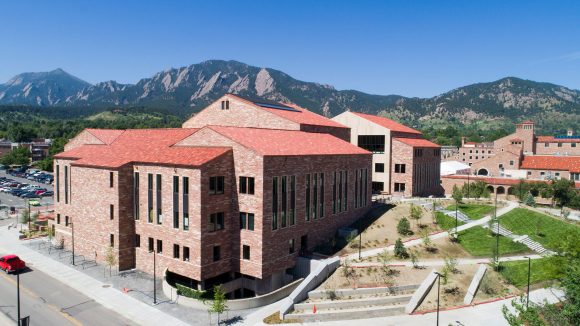
The CASE building, located on the University of Colorado Boulder’s campus. (Courtesy of the University of Colorado Boulder)
National security isn’t a concept reserved for government insiders or those with special clearances. On April 17, the University of Colorado Boulder hosted a conference on national security that intended to bridge military expertise and student engagement on global and national security matters.
Organized by the Peace, Conflict and Security Program, the conference welcomed a select group of fellows and faculty members from the U.S. Army War College’s Eisenhower Program. The outreach program aims to bring military perspectives on national security issues to college and civic audiences. This event, led by four experts in different military fields, covered topics across the geopolitical scale, discussing situations from the involvement of women in the military on a worldwide scale to specific international laws.
“I am very interested in foreign policy and national security and am always curious to learn more about current events and policies. I think students who do not have a military background tend to only hear a more critical or academic view of national security, so I was interested in hearing from individuals who had first-hand knowledge and expertise in the field,” said CU Boulder student Elijah Parkes who attended the panel, which was held in the Center for Academic Success and Engagement.
Lieutenant Colonel Wade Smith, a CU Boulder alumni was one of the speakers at the event.
“It is good to be back home; it’s been about ten years since I have been back on campus. It is good to see the institution growing,” Smith said, adding, “I was pleasantly surprised when I got my graduate degree in international affairs at Rutgers, that the first year was largely review because the institution here had prepared me so well for that level of study.”
Currently working as an aircraft maintenance officer, Smith gave his perspective on the significance of meaningful allies and partnerships nationwide and globally.
“Alliances and partnerships are incredibly important to the US national security… Most importantly, alliances and partnerships provided deterrence. Just like on a playground, if you have a bully who is acting aggressively and violating international norms, but then you have the other students on the playground stand up to the bully and say ‘no, that’s not how we do this,’ more than often that bully takes a step back, and realizes ‘is this something I want to get involved with?’”
To engage the participation of students and attendees, the panel opened up the conversation to questions from the audience.
One student asked, “How do you see impacts of foreign nations that limit women’s education or involvement in the military?”
Panelist Lieutenant Colonel Qiana Harder responded, “[Nations that allow women to serve] are strengthening land components by allowing more women to serve beyond the administrative roles that they typically get to serve in. In the Pacific, a lot of our exercises and engagements with our partners, we ask them if they could send a significant contingent of their female officers and enlisted military members to engage with ours so that we can strengthen that way. Not only are we teaching their women, but we are teaching their men as well.”
While much of the discussion was focused on the military, Parkes said he appreciated the wide range of perspectives on the different jobs in the national security field.
“My favorite part was hearing the variety of backgrounds that each speaker had, varying from an officer who was first an enlisted soldier now working in logistics to another officer whose work was focused on international relations in the military and engaging with other countries,” said Parkes.
Contact CU Independent Staff Writer Satori Griffith at Satori.Griffith@colorado.edu.
